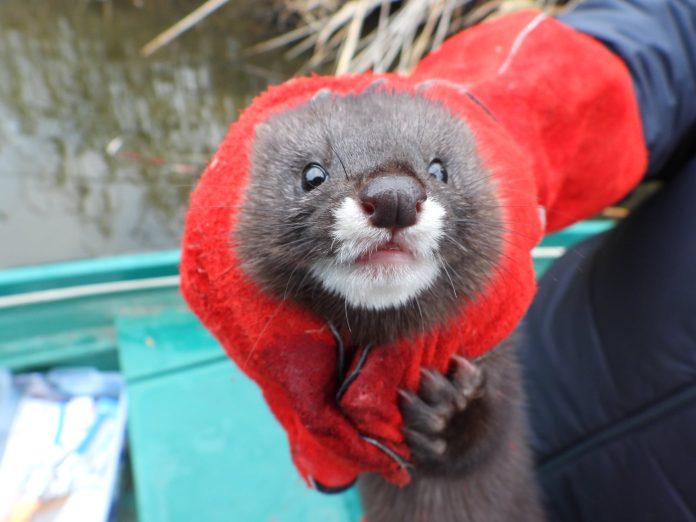The European mink, one of the rarest and most endangered mammal species in Europe, will have artificial islands built especially for it in the Danube Delta, built under a project financed through the Large Infrastructure Operational Programme 2014-2020, initiated by the Danube Delta Biosphere Reserve Administration (ARBDD), according to Agerpres.
As part of the project, the Institute’s specialists created a special page on Facebook, called „Saving the European mink – Save EMinkRo,” and interested persons can find out the status of the species conservation activities.
„The European mink is one of the rarest and most endangered mammal species existing on our continent, currently surviving only in 5 countries on the globe: Russia, Spain, France, Ukraine and Romania. The Danube Delta Biosphere Reserve represents one of the last refuges of this species, but it once had a wide range in Romania. In the Delta, the European mink is widely distributed, practically, except for the extended waters, localities, agricultural and forestry polders, the presence of the species has been confirmed in most areas. The European mink population here has been evaluated at a minimum of 1,130 specimens and a maximum of 2,280 specimens,” reads a material sent by the Danube Delta National Research-Development Institute (INCDDD) at the request of Agerpres.
A predominantly nocturnal, terrestrial and aquatic animal, the mink swims using all four legs. It leads a solitary life or, temporarily, in a family, and does not hibernate in winter.
„Minks have been observed during the day both in the cold and in the warm season. They make their shelters in the widened galleries of water rats or muskrats, usually near the trees on the water’s edge, mainly willows. Sometimes also in hollows, on the ground, reeds or thickets of grassy vegetation,” the afore-mentioned document shows.
It prefers habitats with flowing or stagnant water, with bushes, reeds, wide tussocks and dense vegetation.
„Regarding its food, the mink is not specialised in a particular prey. According to the studies carried out by our specialists, the food of the European mink in the Delta varies according to the season, but it is generally represented by small and medium-sized fish, amphibians and small mammals. The daily food requirement is about 140-180 grams. In some areas, the bulk of the food, up to 85%, consists of batracians – newts and frogs, but also fish and crustaceans. When the food reserves in the area are abundant, especially in autumn, the mink makes reserves, gathering fish, frogs and mice. In some situations, it can deposit up to 15 kilograms of food,” INCDDD specialists say.
Partners meet for reproduction in February-March. Sexual maturity is reached from the age of nine months. Calvings take place in June-July and there is only one reproduction per year, after which the female gives birth to four to seven cubs.
„If in captivity European minks can live 10-12 years, in the wild they live 7-8 years. The causes that determine the dynamics of the size of the European mink population are divided into natural, abiotic and biotic ones, and those caused directly or indirectly by human intervention,” mentions the quoted source.
The cause of the European mink extinction from central Europe is not elucidated, but it is likely that the dramatic reduction and fragmentation of wetlands contributed significantly to the decline and, finally, the disappearance of the species.
„Even if these causes vary, there is still a common denominator – the change in environmental conditions. In conclusion, the real and indisputable reason for the decline of the European mink consists primarily in the destruction of natural habitats, especially of wetlands on a pan-European level, which overlap – at least in the conditions of the Danube Delta – hunting with guns and non-selective traps, especially those used for muskrats,” the INCDDD representatives show.
According to the cited source, there are other limiting factors on the territory of the Reserve, and among them are poaching, chaotic tourism, the burning of reeds, the disturbance caused by high-speed boats, the explosion of fishermen’s constructions in the higher areas of the Delta, areas usually used by minks. Also the cars that drive on the road sections that cross the wetlands of the Reserve are a danger for these animals.
ARBDD Tulcea, in partnership with INCDDD, is conducting, between August 1, 2019 and December 31, 2023, the project „Ensuring a favorable conservation status to save the European mink population from extinction – Mustela lutreola (species of community interest, critically endangered) – from Romania – SAVE E-MINK-RO (2017-2020)”.
The general objective of the project is the implementation of some measures from the Management Plan of the Danube Delta Biosphere Reserve to improve the conservation status of the European mink (Mustela lutreola) in the Danube Delta. Among the actions expected to take place within the project are the determination of the state of health of the specimens in the Reserve, the creation of artificial habitats for the species by raising the banks of some canals in the central area of the Delta and the construction of some canals on artificial islands in the Delta, as well as the assessment of the threats faced by the European mink in the area.
The total estimated budget of the project is 40.6 million lei, of which 85% represents the eligible non-refundable amount from the European Regional Development Fund.
Agerpres


